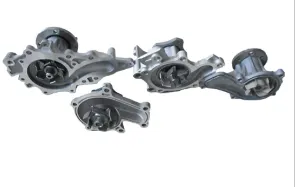Handy, Mobiltelefon:+86-311-808-126-83
Email:info@ydcastings.com
The Science Behind Fail-Proof Automotive Water Pumps
In the intricate ecosystem of modern automotive engineering, automobile water pumps serve as the circulatory heart of engine cooling systems. These precision components work in tandem with engine manifolds to regulate thermal dynamics, ensuring optimal operating temperatures. The advent of automotive electric water pumps has revolutionized thermal management, offering superior efficiency and reliability compared to traditional mechanical systems. This article delves into the engineering marvels that make today's water pumps virtually fail-proof, exploring material science, hydrodynamic design, and smart integration with engine architecture.

Cooling System Fundamentals Automobile Water Pump
Der auto wasserpumpe operates on principles of fluid dynamics and thermal exchange, circulating coolant through a closed-loop system that includes engine manifolds and radiator networks.
- Hydraulic Efficiency– Modern impeller designs employ computational fluid dynamics to optimize coolant flow rates, reducing parasitic energy loss while maintaining maximum heat transfer capability. The vanes are precision-cast to minimize turbulence and cavitation.
- Thermal Regulation– By maintaining consistent coolant circulation, these pumps prevent localized hot spots in engine manifoldsthat could lead to material fatigue or combustion chamber distortion. Advanced alloys in manifold construction complement this thermal management.
- System Integration– Contemporary automotive electric water pumpsinterface directly with engine control units, allowing variable speed operation based on real-time thermal loads rather than fixed mechanical drive ratios.
Material Science Breakthroughs Automobile Water Pump
The durability of automobile water pumps stems from revolutionary material applications that withstand extreme thermal cycling and chemical degradation.
- Bearing Technology– Ceramic hybrid bearings in automotive electric water pumpsdemonstrate 300% longer service life than conventional steel bearings by eliminating electrolytic corrosion and reducing friction coefficients.
- Composite Seals– Fluorocarbon elastomer seals maintain integrity across -40°C to 200°C temperature ranges, preventing the coolant leaks that account for 38% of traditional pump failures.
- Casting Innovations– Investment casting techniques produce engine manifoldswith wall thickness variations under 0.5mm tolerance, ensuring uniform heat dissipation without flow restrictions.
Electric Pump Advancements Automobile Water Pump
The transition to automotive electric water pumps represents a paradigm shift in thermal management strategies for modern powertrains.
- Demand-Based Operation– Unlike belt-driven pumps that waste energy circulating coolant during cold starts, electric variants activate only when needed, improving fuel efficiency by 2-3% in internal combustion engines.
- Fail-Safe Architectures– Redundant winding configurations in brushless motors allow continued operation even if one phase fails, while integrated diagnostics predict bearing wear before failure occurs.
- Hybrid System Synergy– In electrified vehicles, these pumps coordinate with battery cooling circuits, using shared coolant loops to reduce system complexity and weight.
Manifold-Pump Integration Automobile Water Pump
The symbiotic relationship between engine manifolds and automobile water pumps dictates overall cooling system effectiveness.
- Flow Path Optimization– Computational thermal mapping ensures manifold passages direct coolant to critical areas like exhaust ports and turbocharger housings first, before returning to the radiator.
- Thermal Expansion Compensation– Differential growth rates between aluminum manifolds and iron engine blocks are accommodated through flexible coupling designs in modern pump housings.
- Pressure Balancing– Bypass valves in electric pump systems maintain stable pressures despite viscosity changes in coolant mixtures, preventing cavitation damage to manifold surfaces.
Failure Prevention Strategies Automobile Water Pump
Understanding failure modes has driven innovations that make contemporary automobile water pumps remarkably reliable.
- Cavitation Mitigation– Laser-etched impeller surfaces create micro-turbulence that prevents vapor bubble formation, the primary cause of erosion damage in pump volutes.
- Corrosion Resistance– Nano-ceramic coatings on aluminum components provide galvanic isolation when dissimilar metals interface in the coolant stream.
- Wear Monitoring– Embedded sensors track bearing play and seal degradation in automotive electric water pumps, enabling predictive maintenance before catastrophic failure occurs.
FAQs on Automotive Water Pumps Automobile Water Pump
What distinguishes premium automobile water pumps from economy versions?
High-end units feature machined (not cast) impellers, aerospace-grade bearings, and lab-tested seals that withstand 5,000+ thermal cycles without performance degradation.
How do engine manifolds affect automotive water pump longevity?
Properly designed manifolds maintain laminar coolant flow, reducing pump workload. Restrictive or poorly cast manifolds create turbulence that accelerates impeller wear.
Why are automotive electric water pumps gaining popularity in performance applications?
Their ability to maintain coolant flow during engine-off periods (like after turbocharger use) prevents heat soak damage, while precise flow control enables tighter engine tolerances.
What maintenance extends water pump service life?
Biennial coolant replacement with silicate-free formulations prevents abrasive particle buildup, while periodic inspection of pulley alignment (in mechanical pumps) reduces bearing loads.
Can aftermarket pumps match OEM reliability?
Only when produced to original equipment specifications, including material certifications and dimensional tolerances within 0.01mm - a standard maintained by precision manufacturers.
The evolution of automobile water pumps and their integration with advanced engine manifolds demonstrates how material science and smart engineering converge to create systems that rarely fail. As automotive electric water pumps become the industry standard, their self-diagnostic capabilities and adaptive performance redefine what "fail-proof" means in thermal management technology. These innovations mirror the precision engineering principles applied across modern automotive systems, where every component must deliver uncompromising reliability under extreme operating conditions.
-
Materials Used in Manufacturing Cap End Pipe FittingsNachrichtNov.24,2025
-
Material Properties of CF8M CastingNachrichtNov.24,2025
-
How to Inspect Pump Cap Ends for DamageNachrichtNov.21,2025
-
Backward Curved Impeller – Efficient Airflow Solutions for Industry | YD CastingsNachrichtNov.21,2025
-
Automobile Water Pump - Efficient, Quiet, Durable & ElectricNachrichtNov.21,2025
-
Impeller for Pumps – High-Efficiency, Durable, OEM-ReadyNachrichtNov.21,2025











